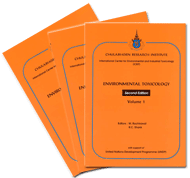Environmental Toxicology (Second Edition, 2002)
Environmental Toxicology (Second Edition, 2002)
Environmental Toxicology
(Second Edition, 2002)
TABLE OF CONTENT
PREFACE
Increasing use of chemicals is inevitable in the process of national development as well as in the promotion of better standards of living and human well-being. A thorough knowledge of toxicology and appropriate technology together with proper management is vital for the prevention of chemical hazards and safeguarding human health and the environment from the adverse effects of chemicals. Successful programs for chemical safety require suitably trained human resources in government, industry and academe, and an informed awareness in the general public.
At present, the need for qualified personnel trained in toxicology and environmental management is urgent. Chulabhorn Research Institute has therefore initiated a capacity building program to assist developing countries to develop human resources in these specific areas. The program comprises a post-graduate education program in Environmental Toxicology,, Technology and Management at M.Sc. and Ph.D. levels and a short term training program with a series of training courses. Both programs have international experts from renowned institutes / universities in their faculty.
The program addresses the training needs of both health scientists and engineers by integrating the principle of toxicology and engineering practices to foster a multidisciplinary approach for the safe use of chemicals in development. A three-volume book on Environmental Toxicology has been specially designed in the form of a concise compendium of essential information in all areas of toxicology.
The program will endeavor to make an important contribution to human resource development for sustainable economic and industrial development.
Editors:
M. Ruchirawat
R.C. Shank
ACKNOWLEDGEMENT
The preparation of this publication is supported by United Nations Development Programme (UNDP) (Project: THA/97/004: Capacity Building in Environmental Toxicology, Tchnology and Management to Promote Sustainable Development in Thailand).
CONTRIBUTORS
![]()
![]()
Donald J. Ecobichon
Professor (Honorary),
Department of Pharmacology and Toxicology
Queen’s University, Kingston, Canada
![]()
![]()
Herman Autrup
Professor, Department of Environmental and Occupational Medicine
The Steno Institute of Public Health
University of Aarhus, Denmark
![]()
![]()
Davide Calamari
Professor, Environmental Research Group
Department of Functional and Structural Biology
University of Insubria, Varese VA, Italy
![]()
![]()
Mathuros Ruchirawat
Vice President for Research and Head, Laboratory of Environmental Toxicology
Chulabhorn Research Institute and Department of Pharmacology, Faculty of Science
Mahidol University, Bangkok, Thailand
Jutamaad Satayavivad
Associate Vice President for Scientific Affairs and Head, Laboratory of Pharmacology
Chulabhorn Research Institute and Department of Pharmacology, Faculty of Science
Mahidol University, Bangkok, Thailand
![]()
![]()
John H. Duffus
Director, The Edinburgh Centre for Toxicology
Department of Biological Sciences
Heriot-Watt University, United Kingdom
![]()
![]()
Richard A. Becker
Senior Director, Public Health Team, American Chemistry Council
1300 Wilson Boulevard, Arlington, VA 22209, U.S.A.
Joseph F. Borzelleca
Professor Emeritus,
Toxicology and Pharmacology, Inc. and Medical College of Virginia, Richmond, Virginia, U.S.A.
Ronald C. Shank
Professor, Director, Environmental Toxicology Program and Chairman,
Department of Community and Environmental Medicine
University of California at lrvine, California, U.S.A.






